Fainting is considered a short-term loss of consciousness. The main determining factor is metabolic disorders. A short-term one-time fainting during menstruation is not dangerous. Fainting during the menstrual period is rare. A woman is alarmed by the occurrence of this symptom on menstrual days. If symptoms recur regularly, a medical examination of the woman is required.
Sometimes girls may faint during their periods.
What is fainting and what are its types?
The medical term for fainting is syncope. This is a manifestation of a sudden loss of consciousness for a short period of time, which is caused by insufficient blood supply to the brain. The brain is limited in oxygen and nutrients.
According to statistics, 50% of the world's population have experienced this disorder at least once.
There are several types of fainting:
- neurogenic;
- hyperventilation;
- somatogenic;
- extreme.
These types of fainting include some subtypes.
For example: neurogenic happens:
- vasodepressor – manifests itself during emotional and stressful changes, occurs in people who are frightened at the sight of blood;
- orthostatic - expressed with a sudden change in body posture, as well as due to taking certain medications; this group of fainting includes wearing tight things with a tight neck, and orthostatic fainting occurs in people with urinary incontinence during sleep, coughing and when passing feces;

With a sudden change in position, dizziness and even fainting may occur
- disaptive – activated when it is difficult to adapt to the climatic environment (very hot or, conversely, cold microclimate);
- hyperventilation - appears with severe fear or panic;
Somatogenic – has an interdependence with dysfunction of internal organs. Somatogenic is also divided into cardiogenic, anemic and hypoglycemic.
- cardiogenic – expressed in cardiac pathologies;
- anemic – expressed with reduced hemoglobin and a reduction in red blood cells;
- hypoglycemic – with insufficient glucose levels.
Extreme syncope can be: hypoxic, hypovolemic, intoxicating, drug-induced and hyperbaric:
- hypoxic – occurs due to oxygen starvation;
- hypovolemic – expressed due to severe blood loss, heavy menstrual flow, extensive burns;
- intoxication – develops with various types of poisoning;
- medicinal – when using drugs that help lower blood pressure;
- hyperbaric - manifests itself as a result of increased atmospheric pressure.

Poisoning can lead to fainting
Each of all types of fainting has its own characteristics and mechanism of development of painful manifestations.
What are the types of fainting and why are they dangerous?
Dizziness and fainting can have many different causes, and often the doctor can rule out cardiovascular disease by questioning the patient. Based on the survey results, the cardiologist prescribes tests and strives to make an accurate diagnosis. Dizziness and fainting can have many different causes, and often the doctor can rule out heart disease when interviewing the patient. A short-term loss of consciousness occurs as a result of a sharp decrease in blood pressure, which disrupts cerebral circulation. If hypoxia lasts longer, the patient may experience muscle cramps and involuntary urination. Often, after fainting, the patient comes to his senses quite quickly. Fainting in the presence of cardiovascular disease is most often associated with arrhythmia, when bradycardia or tachycardia can lead to a sudden decrease in blood pressure and loss of consciousness.
Fainting is a brief absence of consciousness caused by a sudden disruption of blood circulation in the brain. This happens because the brain does not receive enough oxygen and nutrients.
What are the causes of fainting during menstruation?
Fainting during menstruation is associated with only short-term changes in the body. Hypotension appears to be the underlying factor in fainting during the menstrual cycle. This is observed when the female body does not adapt to bleeding in a timely manner, and the heart muscle, as a result of increased load, does not function properly at low pressure.
Poor blood supply to the body leads to oxygen deficiency. This may lead to the development of corresponding symptoms.
During menstruation, there are still possible provoking factors that result in fainting:
- the presence of pain during menstruation;
- frequent periods of depression and stress;
- severely reduced blood hemoglobin;
- hypotension (low blood pressure);
- physical stress.
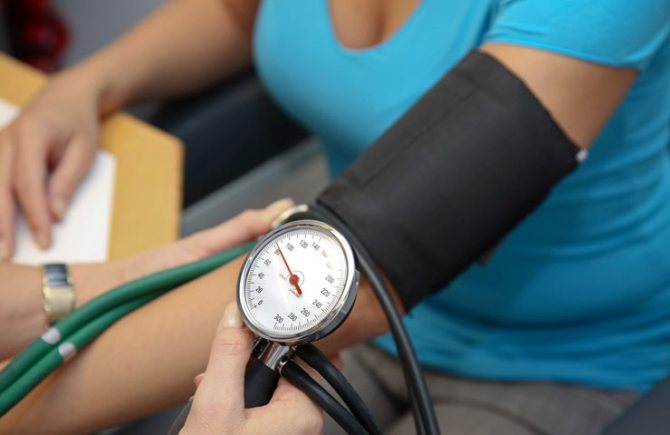
If your blood pressure drops, you may lose consciousness
Factors that provoke fainting
The most common reasons
The main causes of fainting during menstruation are:

- A sharp drop in blood pressure . Due to significant blood loss, the heart does not cope well with its work, as a result of which the brain cells experience oxygen starvation, which provokes painful manifestations.
- Physical exercise . On critical days, the female body is weakened - heavy physical work and heavy lifting are strictly contraindicated.
- A sharp attack of pain . A slight nagging pain is a constant companion during menstruation for many representatives of the fair sex. An attack of severe pain leading to loss of senses can be provoked by spasms in the gastrointestinal tract, bruises, or lifting heavy objects.
- Climatic features . Magnetic storms, changes in atmospheric pressure, too high or, on the contrary, low temperatures can negatively affect the body - and on the days of menstruation it is extremely sensitive to weather changes.
Age-related characteristics affecting the occurrence of the disease
During puberty and menopause, the female body undergoes hormonal changes, and therefore experiences severe and constant stress - therefore, teenage girls and middle-aged women are most susceptible to fainting during menstruation.
Specifics of puberty
The monthly cycle has not yet formed - the periods between menstruation can be short, and the critical days can be long. Excessive blood loss is not uncommon.

Iron-deficiency anemia . A disease that often develops in adolescence due to blood loss during menstruation. Residents of northern latitudes are especially susceptible. Young girls and their parents need to be extremely attentive to their health.
Study loads, stress . The individual traits of a teenager’s psycho-emotional sphere and the rhythm of life also have a certain influence.

Hormonal changes . Hormones influence the state of the nervous and autonomic systems of the body. A small hormonal “storm” can lead to falling into an insensitive state.
Difficulties of menopause
A striking symptom of menopause is hot flashes, which manifest themselves as follows:
- The lady suddenly “throws into a fever.”
- Increased sweating.
- Frequent headaches up to the development of migraines.
- Shortness of breath.
- Dizziness with ringing in the ears and blurred vision.
- Trembling and tingling in the limbs.
- Feeling of "goosebumps" on the body.
- Pressure surges, weather sensitivity.
- Increased irritability, insomnia, depression.
- Body aches and pains.
- Frequent urge to go to the toilet.
- General weakness and fatigue.
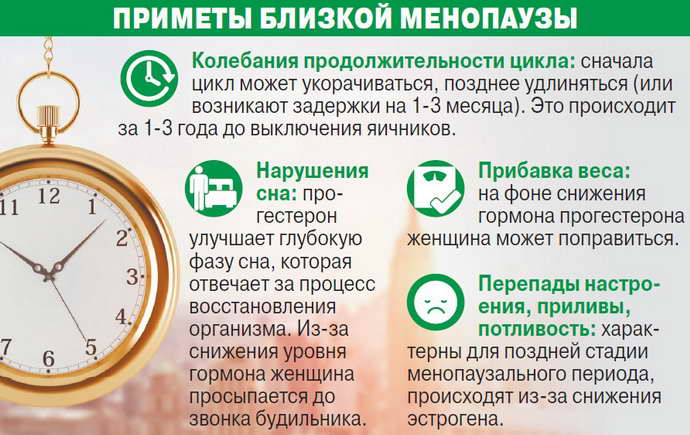
Causes associated with pathologies
Those young ladies who have chronic diseases or had the misfortune of falling ill during their cycle are also susceptible to the disease. Manifestations of pathologies:
- Elevated temperature during ARVI and inflammatory processes.
- Dehydration due to vomiting and diarrhea.
- Drop in blood sugar levels. A common occurrence in blood diseases - especially diabetes.
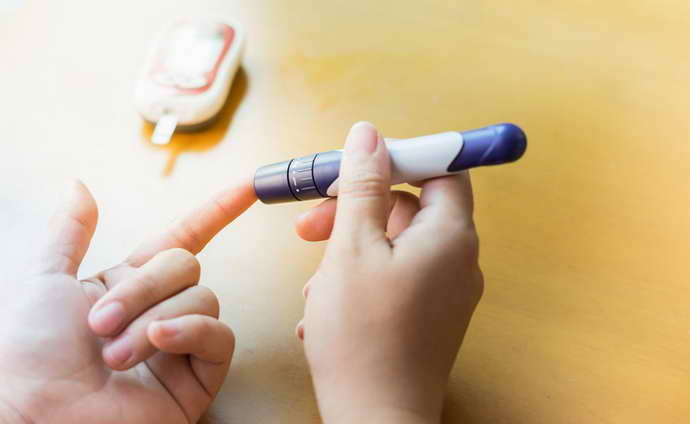
- Phobia, fear of the sight of blood.
- Decreased hemoglobin.
- Excessive blood loss due to injury or nosebleeds.

- Hypercapnia is an excess of carbon dioxide (in case of poisoning).
- Stress, nervous excitability. Severe depressive and neurosis-like conditions manifest themselves with severe pain throughout the body, nausea and disturbances in the gastrointestinal tract.

In addition to the reasons listed, there may also be individual characteristics.
What additional symptoms are present in pathologies?
Pathological causes of fainting during menstrual flow may include the following:
- reduced sugar level;
- increased carbon dioxide levels;
- low blood volume (excessive blood loss);
- emotional stress (for example, fear);
- dehydration of the body due to pathological processes in the body (diarrhea, vomiting, frequent urination, profuse sweating, etc.).
There are cases when overvoltage can be a provoking factor. It is caused by a decrease in blood circulation, which must return to the heart.
There is another factor that can provoke fainting during menstruation - algomenorrhea. The main symptom is pain in the lower abdomen, which affects mainly the first days of the critical days, but subsides after two or three days. According to statistics, there are 16% of cases of fainting due to cramping pain caused by uterine contractions.
Algomenorrhea manifests itself in three degrees:
- light:
- average:
- heavy.

You can faint with grades 2 and 3 algomenorrhea
In the first, mild degree, the pain is moderate and is usually not predisposed to fainting. Fainting is possible with the third and second forms. A similar phenomenon is associated with intense hanging pain, accompanied by general weakness, hyperthermic syndrome, vomiting, migraine headaches, etc.
In this physiological situation, a reflexive protective process is activated in the body from a real danger that is difficult for it to endure. As a result, during the monthly cycle, a woman may faint.
Specifics of the pathology
Fainting is a short-term loss of consciousness due to deterioration of blood microcirculation, which provokes poor blood flow to the brain structures. It is a mild form of a disease such as vascular insufficiency.
Causes
Depending on the cause, there are different types of fainting. Among them:
- Vasovagal. This is the most common type of syncope (more than half of all syncope is vasovagal). It occurs as a result of the body’s reaction to physiological or psychosomatic provoking factors (overheating, taking a hot bath, the sight of blood, and others). In this case, there is a sharp decrease in blood pressure and heart rate.

Hypoglycemic. It is associated with a decrease in blood sugar levels.- Intoxicating. Occurs due to poisoning of the body.
- Emotional. Its appearance is provoked by a person’s excessive emotionality.
- Cardiogenic. Appears due to heart rhythm disturbances.
- Medication. The appearance of such fainting is due to the body’s reaction to taking certain drugs.
- Anemic. The condition is associated with poor circulation.
Other types of fainting may also occur. Most often, women experience fainting during the menstrual cycle or during menopause.
Development mechanism
During menstruation, a short-term loss of consciousness does not occur on its own, but against the background of certain reasons. In this case, there is a slowdown in the heartbeat and a sharp decrease in blood pressure, which leads to a deterioration in oxygen supply to the brain. As a result of such processes, a woman may faint.
Why does short-term loss of consciousness occur? The main causes of this condition are:

severe pain that occurs in women before or during menstruation;- low hemoglobin;
- hypotension (low blood pressure);
- stress or depression;
- physical or psychological overload;
- hormonal imbalance (often occurs during puberty in adolescents).
Such conditions that cause lapses in consciousness are of a physiological nature and are not associated with pathologies. Therefore they are considered non-hazardous. In order to avoid such fainting, you just need to eliminate the cause that provoked it.
In some cases, it is not only pain during menstruation or stress that provokes fainting. Certain diseases and pathological processes cause loss of consciousness in women during menstruation. Among them:
- excessive carbon dioxide content;
- diseases associated with high blood sugar (diabetes mellitus);
- significant blood loss;
- dehydration after diarrhea, excessive sweating or urination.
How to provide first aid for fainting
If a woman has lost consciousness, it is necessary to make sure that air passes freely into the respiratory system. After detecting a pulse, you need to listen to how the woman breathes. If the pulse is not palpable or breathing is not observed, you should immediately perform an indirect massage of the heart muscle, but this must be done professionally.
When breathing is present and a pulse is felt, the woman is placed on a flat, hard surface. Without placing pillows, just raise your legs by 30 centimeters. Then you should loosen the belt at the waist and unbutton the collar of your clothes.

For relief, you can place a towel on your forehead
Place a damp towel on your forehead and wipe your face with cool water. If a woman suddenly feels nauseous, she must be carefully moved to her side. If it is impossible to turn over, then you can tilt your head to the side. This will help prevent ingestion of vomit and asphyxia.
If fainting occurs indoors, you should open a window to provide the room with fresh air.
You should not pour water on a woman, slap her in the face, or let her sharply inhale a concentrated ammonia solution. Until the woman fully enters a healthy state, it is not recommended to drink or eat.
It is necessary to increase the tone of arterial vessels and normalize blood pressure with the help of medications and caffeine-containing drinks. If a woman is injured when she faints, it is necessary to call an ambulance in order to provide medical measures and further necessary examination.
First aid for loss of consciousness
Self help
If she feels impending deprivation of senses, a girl can try to help herself in the following way:
- Go out into the fresh air or open the windows;

- Rub your earlobes until they turn red.
- Press on the points under the lower and above the upper lip.
- Lie down - your legs should be higher than your torso.
- Douse yourself with ice water.

- Bring a cotton swab soaked in ammonia or another substance with a strong odor to your nose—cologne or citrus perfume will do.
You need to start acting as soon as your health worsens.
How to revive the victim
If a woman faints during her period, she must immediately proceed to the following actions. Avoid falling sharply and hitting your head. Lay the patient on a flat horizontal plane, raise her legs by about 30 cm and secure her in this position.
Unbutton your clothes at the throat and chest, remove the scarf. Check pulse and breathing. If necessary, perform artificial respiration and chest compressions.
In case of vomiting, turn the girl on her side and try to eliminate the vomit to prevent it from entering the respiratory tract.

Provide a flow of clean air. Apply cold to your face or wipe with a cloth soaked in cold water. Insulate your legs, especially your feet. After the lady has woken up, wrap her in something warm. Give medicine containing caffeine or drink warm, sweet tea - black or hibiscus.
After or during these events, even with the most successful ending, it is recommended to consult a doctor.
What not to do: hit the victim on the cheeks, pour cold water on her, give her something to drink until she wakes up - ammonia is also not advisable. Green tea is contraindicated - it lowers blood pressure.
Signs of an approaching illness
Symptoms for each young lady are individual - they depend on the age and specifics of the body. But there are also common features: sudden weakness, pale skin or painful blush, blue lips, dizziness, nausea, circles before the eyes, ringing in the ears, tingling in the extremities, accompanied by chills, cold sweat, “woolly legs.”

Usually the fainting state lasts from a couple of seconds to 4 minutes. If consciousness does not return for more than 5 minutes, the woman must call an ambulance. Further symptoms are dangerous - convulsions and involuntary retraction of the tongue into the throat may begin.
Fainting during menstruation: first aid and causes of loss of consciousness
Fainting occurs for a variety of reasons, but the immediate common cause is usually a sudden drop in blood pressure, which in turn leads to a short-term reduction in blood flow and oxygen delivery to the brain. Usually, but not always, a person immediately before losing consciousness feels lightheaded or dizzy, and may also complain of darkening of the eyes and ringing in the ears. In addition, nausea, vomiting, sweating, and rapid or slow heartbeat may occur. The most common type of fainting occurs due to improper reflex interaction between the cardiovascular and nervous systems, as a result of which the cardiovascular system selects a heart rate and degree of relaxation of the body’s blood vessels that is inadequate to the current situation. In patients suffering from organic heart muscle disease, fainting often occurs due to an excessively fast heartbeat. In such a situation, the heart simply does not have time to eject the amount of blood necessary to ensure normal functioning of the brain, and the doctor may decide to perform a special heart operation to eliminate or cauterize the source of such arrhythmia, see below.
How to identify presyncope
Signs of imminent syncope:
- sudden dizziness;
- darkening or “silver veil” in the eyes;
- manifestation of nausea;
- numbness, tingling sensation in the arms and legs;
- weakness in the legs;
- feeling of “coldness” inside;
- the appearance of cold sweat;
- pale facial skin.
It is important to notice the approach of fainting in time to have time to sit or lie down. This will help protect you from falling and hitting your head.
Features of manifestation
Most often, fainting in women occurs against the background of algomenorrhea. This is a special condition in women that occurs during menstruation due to contractions of the uterus. It is accompanied by severe pain in the lower abdomen. In a mild form, the pain is moderate, so fainting is not observed. Fainting occurs with severe algomenorrhea, when the following negative signs appear against the background of severe pain:
- high body temperature;
- weakness in the body;
- severe dizziness and headaches;
- nausea and vomiting.
This condition forces the female body to turn on the defense mechanism. In this case, consciousness is temporarily turned off in order to survive the pathological process. How do you understand that if a woman faints, it was caused by menstruation? First of all, loss of consciousness occurs only during menstruation or before it begins.
What characteristic symptoms appear when fainting approaches? They depend on the woman’s age, as well as her individual characteristics. The following signs are often observed:
- noise or ringing in the ears;
- severe dizziness;
- tingling sensation in the body (especially in the limbs);
- the appearance of internal cold;
- the appearance of nausea;
- blurred vision;
- weakness in the legs (“cotton legs”);
- the appearance of cold sweat;
- pale skin (especially on the face);
- dilated pupils do not respond well to light.
At the same time, the woman’s legs give way due to decreased muscle tone and weakened reflex functions of the body.
Finally
It is important to prevent the occurrence of fainting during “critical days”. To do this, you need to find out their reasons and radically reconsider your diet. The diet should include foods rich in vitamins. Fresh vegetables and fruits, as well as soups, cereals and cereals, are very useful. Semolina and rice porridges are of great benefit. During “dangerous days” it is recommended to drink plenty of fluids. Fizzy drinks and alcohol should be abandoned in favor of fruit drinks, compotes, freshly squeezed juices, high-quality mineral water and tea. It's better to quit smoking.
How is the diagnosis carried out?
The first thing you need to do:
- blood analysis;
- sugar indicator;
- ECG;
- chest x-ray.

Diagnosis includes a blood test
When examining a woman, the doctor may refer her for additional diagnostics. The most common methods for diagnosing fainting include the following studies:
- electrocardiography;
- Holter monitoring;
- electrophysiological study;
- echography and catheterization;
- electroencephalography;
- cerebral angiography;
- head scan;
- determination of glucose tolerance.
When you need to see a doctor urgently
Fainting occurs as a result of impaired metabolic flow and blood circulation, resulting in neuronal hypoxia. The causes of an attack are different, and are not always physiological. Fainting may indicate the presence of serious pathological factors in the body, such as:
- somatic diseases;
- neurotic diseases;
- malignant neoplasms;
- atherosclerosis of the vessels of the head;
- heart diseases;
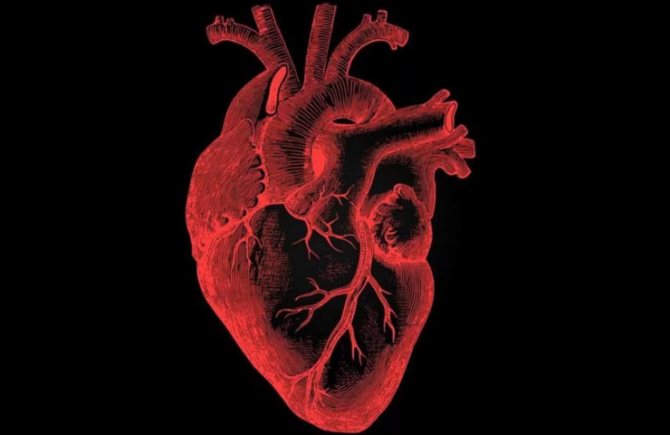
Fainting often occurs in the presence of heart pathologies
- aneurysm of the vessels of the head;
- massive blood loss;
- blood diseases;
- arterial pathology;
- low blood pressure;
- high blood pressure;
- cardiopsychoneurosis;
- intoxication with poisons;
- diabetes;
- infectious course in the body.
In case of frequent cases of fainting, or a long stay in an unconscious state, you must immediately consult a clinic and undergo the prescribed examination.
Dizziness, fainting
Each woman is individual, just like her body, some tolerate menstrual bleeding well, for others severe headaches, painful, pulling sensations in the lower abdomen are common symptoms. Fainting during menstruation is uncommon, but occurs in some patients. Syncope during menstrual periods requires special attention; such a condition may be a sign of illness.
Fainting or syncope is a short-term loss of consciousness associated with oxygen deprivation of the brain. Classified as a mild form of vascular insufficiency. Types of unconsciousness:.
Drug-induced syncope, a side effect of some medications, also occurs. Fainting before menstruation is more often associated with cardiogenic causes or a sharp decrease in blood pressure. Fainting occurs as a result of impaired metabolic flow and blood circulation, resulting in neuronal hypoxia.
The causes of an attack are different, and are not always physiological. Fainting may indicate the presence of serious pathological factors in the body, such as:. Fainting often occurs in the presence of heart pathologies. In case of frequent cases of fainting, or a long stay in an unconscious state, you must immediately consult a clinic and undergo the prescribed examination.
It is important to notice the approach of fainting in time to have time to sit or lie down. This will help protect you from falling and hitting your head. Fainting during menstruation is not a common problem. Such a symptom may indicate individual characteristics of the body or be a sign of illness. This is mainly due to painful, heavy periods. Fainting quickly ends on its own, but this is a reason to consult a doctor. This is especially important if the problem occurs frequently.
Let's look at why fainting occurs during menstruation: reasons for providing first aid in case of confusion. And also, how to recognize a pre-fainting state in time, and whether you need to worry about such a problem in a teenager. Teenagers and adult women may experience fainting during their period. Reasons characteristic of such syncope:. The attack can cause severe pain during menstruation to the point of fainting.
Infrequently, the cause is sudden fear. Fainting during menstruation from abdominal pain often occurs with severe PMS. Fainting during menstruation is the body not having time to adapt to the loss of blood. This problem often occurs at the very beginning.
If such a symptom occurs for the first time, you must consult a doctor. You need advice from a gynecologist and, if necessary, other specialists. Diagnostic methods:. If fainting is not associated with a serious pathology, treatment is symptomatic. The doctor prescribes medication and may recommend lifestyle changes.
This means a reduction in physical activity and emotional stress, and adequate sleep at night for at least 7 hours. Herbal treatment requires consultation with a specialist. After fainting, it is advisable to drink a glass of black tea. In most cases, bed rest is not necessary. The only justifiable case is heavy menstruation with high fever and severe cramps.
You need to worry if fainting lasts longer than 5 minutes. Sometimes these are indirect signs:. A woman should not be left alone until medical help arrives. It is important to monitor her condition and monitor her pulse and blood pressure. Parents often do not pay attention, associating the symptom with a general restructuring of the body.
But hormonal changes are not a reason to ignore fainting during menstruation in teenagers. The causes of such syncope are often the same as for an adult woman.
Regular syncope may be a sign of:. Medical attention is needed urgently if cramps of the calf muscles or the whole body appear simultaneously. In most cases, syncope ends on its own within seconds.
It is strictly forbidden to slap a person hard on the cheeks, pour water on his face, or let him smell ammonia. A visit to a gynecologist will help to identify dangerous pathologies in time and carry out treatment.
Only a specialist can determine whether this is a normal variant or a pathology that requires treatment. If necessary, the doctor will prescribe an examination and subsequent complex therapy. Every woman’s body is full of surprises, and the changes that occur during the menstrual cycle make their own adjustments and affect how she feels.
For some ladies, critical days pass calmly and are only occasionally disturbed by unpleasant symptoms, while for others, strong emotional swings, headaches, nagging pain in the lower abdomen, breast tenderness, etc. are possible. Fainting during menstruation is not so common, but does occur in medical conditions. practice. The occurrence of fainting on menstruation days is very alarming to a woman, and in this regard, quite natural questions arise: how physiological is this condition and how can it be dealt with?
Fainting is a brief loss of consciousness caused by a lack of blood flow to the brain. This condition is a mild form of acute vascular insufficiency.
Simply put, this is a one-time loss of consciousness. In addition to it, the following types are distinguished: Fainting during menstruation most often does not have a pathological etiology and is associated only with temporary processes in the body. The main provocateur of fainting on critical days is low blood pressure. This happens if the female body cannot adapt to blood loss in a timely manner, and the heart muscle cannot cope with the increasing load at reduced pressure.
Insufficient blood supply to body cells leads to oxygen starvation. Also during menstruation there are several other provoking factors that can lead to short-term loss of consciousness: The main symptom of algomenorrhea is pain in the lower abdomen, which occurs mainly on the first day of critical days and subsides on the second or third day. In mild cases, moderate pain usually does not cause fainting.
Fainting is possible only in severe cases and in rare cases in moderate cases. A similar phenomenon is associated with very intense pain, complemented by general weakness, fever, headache, vomiting, etc. In this state, the woman’s body includes a reflexive defense against reality, which is difficult to survive, and as a result, a state of fainting occurs. The onset of menstruation in teenage girls is a difficult turning point in life. During puberty, the physiological functioning of the gonads and the formation of the menstrual cycle usually begin at 12–13 years of age and end at 16–18 years of age.
Sex hormones affect all processes in the body, including their instability, as well as physical and mental stress associated with study and other activities, causing dizziness and fainting.
Low blood pressure, large blood loss, low hemoglobin - all this can also provoke pre-syncope or fainting in a teenage girl. Sooner or later in the life of every woman there comes an unpleasant period - menopause. This time is accompanied by symptoms that are quite difficult not to notice. Initial signs may include weight gain, increased heart rate and irregular periods. The menopausal period is characterized by hot flashes that have a certain clinical severity, namely:
Such signs, and especially in combination, can cause a woman to faint. This most often happens as a result of dizziness, low blood pressure and decreased hemoglobin. The main thing here is to arm yourself in time and be prepared for this period. You can notice the approach of fainting during menstruation in advance. Depending on the age and individual characteristics of the body, the following symptoms may be present:. Such symptoms do not last long. The usual duration of fainting ranges from a few seconds to 3 to 4 minutes.
The human body has the ability to self-regulate, and a woman can recover from a state of fainting on her own. But in a situation where there is an opportunity to help you come to your senses, this is exactly what you need to do. The algorithm of actions in this case looks like this:. If a woman has lost consciousness, it is necessary to make sure that air passes freely into the respiratory system. After detecting a pulse, you need to listen to how the woman breathes. If the pulse is not palpable or breathing is not observed, you should immediately perform an indirect massage of the heart muscle, but this must be done professionally.
When breathing is present and a pulse is felt, the woman is placed on a flat, hard surface. Without adding pillows, just raise your legs about a centimeter. Then you should loosen the belt at the waist and unbutton the collar of your clothes.
For relief, you can place a towel on your forehead. Place a damp towel on your forehead and wipe your face with cool water. If a woman suddenly feels nauseous, she must be carefully moved to her side.
When should you see a doctor?
Usually, fainting conditions have a single episode or a visible cause, after which, after elimination, they no longer bother the young lady. However, in certain situations it is necessary to consult a doctor. When to sound the alarm.
Fainting occurs periodically. Constant cases of deprivation of senses indicate a developing pathology; it is necessary to undergo an examination of the body.
Associated severe blood loss. In this case, you need to call an ambulance immediately! This may be a sign of ectopic pregnancy, perforation of the walls of the uterus (in the case of using vaginal contraceptives), or damage to internal organs.
Panic, fear. The sight of blood and weakness itself are a source of phobia for some women. Living in constant fear leads to neurosis.
Preventing fainting
You can prevent the disease by following simple rules of a healthy lifestyle:
- It is important to maintain a daily routine - eating and sleeping should be regular.
- Eating healthy and fresh food rich in fiber and microelements.
- Plenty of drinking - water, juices, fruit drinks, compotes, herbal infusions;
- Taking vitamins (without fanaticism).
- Healthy sleep.
- Daily walks in the fresh air.
- Physical training.
- Quitting tobacco and alcohol.
Ingredients for decoctions used for prevention: nettle, chamomile, birch, mint, chicory, rose hips, lemongrass, juniper, ginseng, eleutherococcus.
Compliance with these simple norms will have an overall positive effect on your health, which cannot but affect your well-being on critical days.
Fainting during menstruation is an extremely unpleasant phenomenon, but there is no need to panic because of this - the main thing is to know how to help yourself and others and understand the reasons. This problem is completely surmountable - and in most cases it is resolved quite simply.
How is the treatment carried out?
Whether you should undergo medical treatment after a fainting episode depends on its origin. Treatment involves eliminating the underlying disease or stopping the fainting condition itself.
In case of reflex loss of consciousness, provoking factors should be avoided, because this type does not require clinical treatment.
If a woman is predisposed to unconsciousness when donating blood for a laboratory test, she should warn the medical professional about this feature. Then, before the manipulation, the nurse will place the woman on the couch.
In case of frequent fainting, consultation with a doctor is required.
If it is not clear to a woman what triggers an attack of fainting, but the doctor firmly states that there is no danger to health, you can keep a diary yourself to determine the immediate provoking factor.
With anemia, it is important to identify its cause and treat the disease. If you have low blood pressure, you need to stay hydrated, avoid eating large meals, and drink drinks containing caffeine. Typically, blood pressure drops sharply when a person gets up from a sitting position. To prevent this from happening, you can do special maneuvers:
- cross your legs
- tighten your abdominal muscles,
- clench your hands tightly into fists,
- tense the muscles in your arms.
If fainting was caused by taking medications, the doctor should stop or replace the drug or dosage.
For fainting due to heart disease, surgical intervention is possible. Also, in some cases, a specialist may prescribe conservative therapy - taking antiarrhythmic drugs.
This video will tell you what to do if you faint during your period:
To avoid fainting during the menstrual cycle, it is necessary to prevent the occurrence of these manifestations. It is necessary to reduce the risk of sudden loss of consciousness. Reviewing and following the correct diet, changing lifestyle will help improve a woman’s well-being not only during her period.
If fainting on menstrual days is not a frequent occurrence and does not appear with any symptoms that would make you wary, then there is no need to panic too much. You need to reconsider your usual rhythm of life, establish proper nutrition and sleep, get rid of bad habits and do gymnastic exercises in the open air.
If symptoms appear, it is better to consult a doctor to rule out an unclear etiology of the origin of fainting.
general information
If fainting occurs only once, there is no need to panic. This phenomenon is not considered a pathology, but there is a risk that in the future “critical days” will also be accompanied by fainting. Pain or anemia can trigger loss of consciousness. If possible, the “dangerous time” is best spent at home. When fainting recurs periodically, it is recommended to seek medical help as soon as possible.
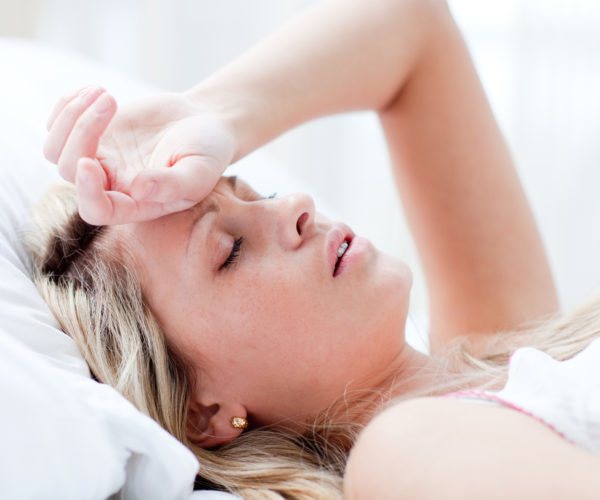
Main provoking factors
There are the following reasons for the development of fainting during “critical days”:
- sharply decreased blood pressure;
- severe pain syndrome;
- decrease in hemoglobin;
- severe stress.
In some cases, we may be talking about a pathological process. Sometimes this happens to young girls who are in puberty.
The main cause of fainting is often a decrease in blood pressure. This happens if a woman’s body cannot adapt to blood loss in a timely manner, or under certain pathological conditions. The heart is not able to cope with the increased load with reduced pressure. In this case, timely release of blood from the heart muscle is impossible.
Against the background of insufficient blood supply, the body's cells experience oxygen hunger, which is not always satisfied. Because of this, the woman feels weak and complains of malaise. Physical activity can be a trigger for fainting. It increases the cells’ need for nutrients, without which the brain can “turn off.”
Additional factors
There are other causes of the pathological condition during the period of “critical days”:
- decrease in circulating blood volume;
- lowering sugar levels;
- increase in carbon dioxide levels.
Preventing syncope attacks
After a crisis, the victim needs complete rest for several hours. If there was a fall during fainting that led to injury, then the patient should be taken to the hospital for medical care and diagnosis.
To prevent syncope during menstrual bleeding, a woman should:
- Eat nutritiously and properly.
- Use multivitamin complexes that compensate for the lack of microelements and vitamins.
- Drink enough fluids to prevent dehydration.
- Avoid overwork and stress.
- During menstruation, try not to drink “fun” cocktails and give up tobacco products.
Crises during menstrual periods can occur against the background of severe pain that appears as a result of spasm of the muscle tissue of the uterus. Sometimes fainting is caused by various processes (dehydration, blood loss) or pathologies (diabetes, anemia).
During an attack, a woman needs first aid; in some cases, a consultation with a doctor is required to determine the cause of syncope. If the provoking factor is illness, competent treatment will be required to prevent fainting.
Adequate and proper nutrition is the key to reducing attacks of syncope
Do I need to see a doctor if I experience regular fainting?
If such a symptom occurs for the first time, you must consult a doctor. You need the advice of a gynecologist, and, if necessary, other specialists. Diagnostic methods:
- collecting anamnesis (data about menstruation, its regularity, duration and frequency of fainting);
- examination (pressure measurement, auscultation and percussion of the heart and lungs);
- comprehensive examination (general analysis and blood glucose, ECG).
If it is necessary to exclude the risk of disease, additional studies are prescribed.
What periods are considered normal?
Menstruation is a reflection of the health of the female body. If the duration, regularity and volume of blood loss are not within the normal range, you need to look for the reasons and eliminate them.
The period between bleeding may initially vary; it may lengthen or shorten. The amount of bleeding sometimes ranges from scanty spotting for a couple of days to intense bleeding.
Pay attention to the following symptoms that may be signs of illness:
- 1The menstrual cycle lasts more than 35 or less than 21 days.
- 2In the middle of the cycle, bleeding and spotting occur.
- 3Menstruations are irregular, there are no equal intervals between them.
- 4The discharge is copious, one pad only lasts for 2 hours.
- 5Bleeding lasts more than 7 days.
- 6 There have been no periods for more than 3 months, and pregnancy is excluded.
- 7There is severe pain in the lower abdomen.
- 8 During menstruation, the temperature rises.
A doctor's help is also necessary for severe premenstrual syndrome. In some girls, its symptoms appear long before menstruation, immediately after ovulation.
The doctor will conduct an examination, find out the causes and prescribe treatment that will help reduce the severity of discomfort.
Treatment
You should not hesitate to see a doctor if indigestion and diarrhea are frequent companions of premenstrual syndrome. If the diarrhea is temporary and only happened once, there is nothing to worry about, most likely it is an intestinal disorder caused by an increased appetite.
Nutritionists recommend following a diet and eating only healthy foods. It is also advisable to reduce the amount of salt, sugar and hot seasonings. To normalize stool, on the eve of menstruation it is recommended to eat foods that strengthen the stool, for example, rice, beef, skinless chicken breast, baked potatoes.
It is also recommended to eliminate from the diet foods that weaken stools and cause increased gas formation. These include all fatty foods, sweets, legumes, cabbage, apples, as well as beets, prunes, and apricots.
Proper nutrition is the only prevention of diarrhea before menstruation. And for treatment they use drugs such as Creon, Mezim and Pancreatin. But first you should consult your doctor.
Many doctors recommend not taking any medications if diarrhea before menstruation is a physiological and normal phenomenon that is not caused by a disease. If, in addition to diarrhea, a woman has frequent fainting before menstruation, it is necessary to always keep ammonia in the house and, when you feel an attack, bring cotton wool to your nose.
Since stressful situations can also provoke such signs, it is recommended to take courses of sedative medications prescribed by your doctor. A few days before your period, you can start taking soothing teas.
Both conditions are treatable. They can also be controlled by proper nutrition, adequate sleep and little physical activity.
If loss of consciousness and heavy bowel movements before the critical days turn out to be the cause of the pathological condition, then it is the disease that needs to be treated. After completing the course of therapy, the symptoms will go away on their own.



